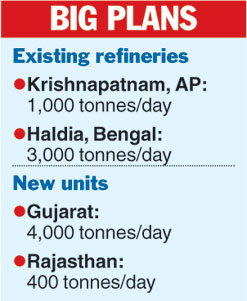
Jorhat, April 26: Crop insurance seems to be low on the list of priorities for the Assam government.
Hit by natural calamities or in this case reeling under torrential rain for the past two weeks, the farmers suffer in silence - forced to be satisfied by the dole given by the disaster management cell under the state revenue department. It is a different matter that the favoured get more than the others and sometimes the entire amount is pocketed or a heavy bribe has to be paid to receive "some amount".
Bipul Sarma, assistant manager, Agriculture Insurance Company of India (AICOF) Limited, said not only had the state government failed to release nearly Rs 2 crore as part of its share of crop insurance and other claims for 2014 and 2015, it had also refused to implement the Pradhan Mantri Fasal Bima Yojana (crop insurance scheme) owing to lack of manpower.
Sarma told The Telegraph over phone from Guwahati that the only crop insurance scheme being implemented in Assam was the Weather Based Crop Insurance Scheme. "Under this, every district weather station gives us data regarding decreased rainfall or increased rainfall, temperature and drought conditions for any given area and it is compared with last year's data. If there is a change in the weather, which could have affected crops, then compensation is paid into the account of the farmer, if there is a claim," he said.
"Apart from the AICOF, the government has allotted eight other agencies like ICICI Lombard, SBI (rural), HDFC and some general insurance companies to implement the scheme in each district," he added.
Sarma said crop insurance was mandatory for loanee farmers and the premium had to be given to AICOF by the implementing agency in the district. In the case of a non-loanee farmer, insuring crop was optional.
"The system is simple - a bank account has to be opened and a certificate from a gaon bura (village head) has to be furnished certifying that he or she is a farmer," he said.
Sarma said in 2014 claims amounting to nearly Rs 13 crore and Rs 15 crore in 2015 remained unsettled but the company was sitting on the money because the state government had not released its share, which was 2.5 per cent. Another 2.5 per cent is borne by the Centre and five per cent by the farmer.
An official of the agriculture department confirmed the state government had not released around Rs 3 crore and the stock excuse given by the finance department was a funds crunch.
"Though we have petitioned the finance department several times, they neither release the state government's share nor the money for publicity and the commission which the implementing agencies are entitled to," he said.
He said owing to shortage of manpower, the central crop insurance scheme, which entailed crop surveillance from village to village, the state government had told the Centre that it could not be implemented and they would continue with the present one.
"From next year probably the scheme can be implemented by outsourcing or bringing in manpower from outside during the agricultural season," he said.
A source alleged the government was not bothered about paying insurance and compensation in order to downplay the damage and show an inflated production figure. It was also because the insurance money did not go through their hands but directly into bank accounts, he added.
Monimala Phukan Borthakur, deputy commissioner of the new Charaideo district, which faced maximum flooding during the recent downpour, said the assessment of crop damage was yet to begin. "Till yesterday, we were more concerned about the safety of people as the Disang had entered human habitation. We will soon take up crop assessment and send the figures to Guwahati," she said.
Debeswar Malakar, deputy commissioner of Lakhimpur district, which also received substantial rainfall, said that crop insurance should have been done. But, usually during this season, the farmers did not go for crop insurance, preferring to insure paddy, he added.
The damage to vegetables has not been that much since there was flooding for six hours before the waters receded," he said.
Jorhat deputy commissioner Solanki Vishal Vasant could not be contacted as he was on his way to New Delhi.
Sivasagar deputy commissioner B.K. Mittal said he could not speak on the issue as he was busy in some court matter in New Delhi.










